- Home
- Julia Quinn
The Lady Most Likely... Page 4
The Lady Most Likely... Read online
Page 4
Gwen swallowed and followed her mother into the room. She supposed one couldn’t say it was crowded, as it was one of those terribly long, rectangular salons with at least a half dozen separate seating areas, but it still felt as if there were a bevy of people in attendance. She glanced around, trying to see if she could find a friend. Oh, there was Kate Peyton. Gwen had always admired her. She was so outspoken and direct. And there was—oh dear—Octavia Darlington. Octavia did not like her. Or at least Gwen was fairly certain that she didn’t. She always seemed to have a pinched-up smile when Gwen approached. And on a few occasions, Gwen was sure that Octavia had very much on purpose pretended not to see her. It had not been a cut direct; Octavia would never have done anything so obvious. But Gwen had known what she was up to. And she supposed she did not have the right to be upset about it; she herself was an expert at pretending not to see people.
She suspected, however, that the motives had been different. Octavia Darlington was not the sort of young lady to hide in corners. Gwen rather envied that about her, actually.
“Miss Passmore,” came the lovely, musical voice of their hostess, Lady Finchley. “I was beginning to fear you would not make it down in time for supper.”
“I’m terribly sorry to be late,” Gwen said, giving a curtsy.
“Lady Stillworth,” Lady Finchley said to Gwen’s mother, “may I steal your daughter away for a moment?”
Gwen’s mother agreed, and Gwen soon found herself with her arm tucked firmly in Lady Finchley’s elbow. “I am so eager for you to meet my brother,” Lady Finchley said.
“Your brother?” Gwen asked with some surprise. She had met Lady Finchley on several occasions, but she had not got the impression that she had become enough of a favorite that she should wish to attempt to match her with a brother.
“My brother Hugh is an earl. Briarly.”
“Yes, of course,” Gwen said.
“What a relief that you know of him. He never goes down to London, you know. I’d feared the world had forgotten him completely.”
“He never goes to London?” Gwen asked. And her delight must have shown in her eyes because Lady Finchley gave her a shrewd look, and said, “You’re a country girl, then?”
“Oh, very much so.”
“I’m a complete dilettante myself. When I’m in London, I miss the country, and when I’m in the country, I declare myself bored. It’s really a vexing way to be.”
Gwen smiled and nodded, hoping that would suffice as a comment.
“My brother is the same way,” Lady Finchley said, then added, “as you, not me. He hates town.”
Gwen nodded again, happy that Lady Finchley didn’t seem to notice that she was contributing very little toward the conversation.
“I suspect the two of you have a great deal in common,” Lady Finchley said. “Ah, here we are. Hugh! Hugh!”
A tall man with thick brandy brown hair turned around. He was quite pleasant looking, Gwen thought, and quite obviously related to Lady Finchley. She liked that his hair was not neatly trimmed. And that his face was a bit tanned. Although …
She took a discreet step back. There was a spot of something brown on his boot that she suspected might not be mud.
“Caro,” he said. “Good God, are we going to eat anytime soon?”
“Hugh,” his sister said pointedly, “this is Miss Passmore.”
Gwen smiled and curtsied.
Lord Briarly blinked twice, then said, “Of course. I am pleased to make your acquaintance.” He took her hand and kissed it, the elegant motion somewhat out of place on so rough-hewn a man.
“I am honored to meet you as well, Lord Briarly.”
He stood for a moment, his brow furrowing. Gwen had the distinct impression that he was thinking of something else.
“Hugh,” his sister said, not sharply, but nearly so.
“Right,” he said. He looked at Gwen, cocking his head to the side, almost as if he were examining her for … well, for something. “I understand you’re from the north, Miss Passmore?”
She nodded. “Felsworth, in Cheshire. We go home directly from here. I am very much looking forward to it.”
“Miss Passmore prefers the country,” Lady Finchley said, without an ounce of subtlety.
Lord Briarly nodded approvingly. “Better for the horses, too. I know there are some who feel they can be stabled properly in town, but I must say, I’m against it.”
Lady Finchley turned to Gwendolyn. “My brother is mad for horses.”
“Do you ride, Miss Passmore?” he asked.
“A bit,” she answered. She had a mare, of course. She’d always had a mare. But she much preferred walking to riding. One couldn’t see anything from atop a horse. Not close enough to get a good look, anyway.
“I do think the country is the only place for children,” Lady Finchley said gaily. “I have such fond memories of Highcross, with my brother and sisters.”
“Highcross,” Lord Briarly said, nodding at the memory. He turned to Gwen with a bit of a grin. “Have you siblings, Miss Passmore?”
“I have—I had,” she corrected, “three brothers.”
“Did you misplace one?” Lord Briarly chuckled.
“He died,” Gwendolyn said quietly.
There was a horrible, horrible silence.
“Please pardon my brother,” Lady Finchley said, leaping into the chasm. “We trot him out only for special occasions.”
Gwendolyn wished she knew how to act at such a moment because she knew that the earl had not meant to cause her distress, and now she was feeling guilty that he looked so embarrassed. But she didn’t know what to say, couldn’t even summon a smile.
“Oh, look!” Lady Finchley said. “There is the Duke of Bretton. Let me call him over.”
Gwendolyn stood awkwardly, waiting.
Lord Briarly stood awkwardly, looking at her feet.
“Here we are,” Lady Finchley said. “Miss Passmore, you know the Duke of Bretton, of course.”
Gwen curtsied as the duke told her how delighted he was to see her again although Gwen didn’t think he really meant it because he immediately launched into something about a horse named Richelieu with Lord Briarly.
“Miss Passmore?”
She turned. It was another young gentleman. No, two of them. George Hammond-Betts and Allen Glover. She had met both in London, several times. They had known her brother Toby at Eton. Sometimes they told stories, and Mr. Glover, in particular, could do such a good imitation of Toby that it always made her laugh.
Funny that. She’d have thought it would make her cry, but it didn’t.
“What a splendid surprise,” one of them said. “I had not realized you would be here.”
“Nor I,” said the other.
“Do you plan to stay the entire week?” the first asked.
“I should love to escort you to Parsley,” said the other.
“Parsley?” Gwen echoed, completely lost now. Were they talking about food?
“As would—”
“It’s the name of the village,” someone new said. “The inn is called the Sage and Thyme. Isn’t that droll?”
“Er …” No. It wasn’t, but Gwen would never say so.
“Miss Passmore.”
Gwendolyn lurched back slightly, turning her head to the right, then—
“Miss Passmore.”
—to the left. “Good evening,” she managed to say as two more gentlemen nosed in. There really wasn’t quite enough room for everyone, and Gwen found herself edged up against the back of the sofa. There were five young men now, all vying for her attention, plus Briarly and the duke, who remained standing next to her, even though they were still arguing about a horse.
Gwen swallowed, trying to smile and nod at all of them, but it was difficult, and she thought she might be nodding in the wrong direction, and not smiling at all, and she really wished they wouldn’t stand so close, although she knew it wasn’t their fault; there wasn’t much empty space in th
is little corner of the room.
“Yes, yes,” she said, when one of them commented on the weather, but then she realized that he’d asked her a question for which that was certainly not the correct answer, and she could only imagine that they must think her the most absolute dimwit, nothing but an empty head with long red hair.
She wasn’t an idiot, she thought miserably, she just acted like one.
She took a breath, trying to focus on the words swirling about her. She really wished that people would take turns talking. But Mr. Hammond-Betts was nattering on about a book of poetry he’d recently read, and Mr. Glover had taken to arguing with him about it, and the other men were saying something about the color of her dress, which Gwendolyn frankly thought was rather ordinary, and if that weren’t enough, Briarly and Bretton were still going on about that horse!
Not for the first time, Gwen wished she possessed a flair for drama. This would be the perfect moment for an extravagant swoon.
With quiet desperation, she glanced over at the clock. It was three minutes past eight. Surely Lady Finchley would lead them into supper soon.
Her stomach growled.
Please. Please let her be the prompt sort of hostess, not the We’re having such a lovely conversation; supper can wait sort of hostess.
She spotted Lady Finchley, who was deep in conversation with a gentleman Gwen did not know, or at least could not recognize from behind. She showed no indication of looking at the clock, or Gwen, or any of her guests for that matter.
Supper, apparently, would wait.
Alec had been playing the dutiful big brother, moving about the room with Octavia on his arm, but finally he declared himself in dire need of a drink, so they’d stopped their amblings and were presently standing near the decanter, Alec with brandy and Octavia with nothing.
It was not the first time Alec had reflected upon how glad he was not to have been born a woman.
“Oh, will you just look at her,” Octavia said disgustedly.
“Lady Finchley?”
“No,” Octavia returned, with the type of exasperation women reserved only for men who shared their last names. “Gwendolyn Passmore.”
Right. The raving beauty. “What did she do this time?” he asked.
“Nothing. That’s the problem. She just stands there, and all the gentlemen flock to her side.”
Alec had to admit that the little swarm surrounding Miss Passmore did look a bit like sheep. Especially Hammond-Betts, whose blond hair had always been a bit fluffy.
“It isn’t fair,” Octavia sighed.
“Jealous, are we?” he murmured.
“Of course I’m jealous. She doesn’t even try.”
Alec looked down at his baby sister. Could it be that Octavia was trying too hard? There was nothing wrong with her, nothing at all. She was friendly and intelligent, and she had a charming smile. She might not resemble Botticelli’s Venus, as Miss Passmore did (with what Alec found almost alarming accuracy), but there was absolutely no reason why she should not be considered a splendid catch for any young gentleman.
And honestly, did Hammond-Betts and whatever the others were named really think they had a chance with Miss Passmore?
He set his drink down. “Come with me,” he said, grabbing his sister’s hand.
“What are you doing?”
“Getting you a flock.”
“What?”
He stopped and looked at his sister solemnly. “You deserve sheep, Octavia.”
And then he hauled her off again, until they were right in the middle of the Passmore passel. “Octavia, dearest,” he said, “would you introduce me to your friend?”
Octavia’s eyes widened with shock, and embarrassment, too, the ungrateful chit, but she recovered (there was a Darlington for you!) and she introduced him to Miss Gwendolyn Passmore, whose eyes had also widened, although if he read her right, hers were with alarm.
“Miss Passmore,” he said elegantly, bowing over her hand. “I have heard so much about you. How can it be that we have never been introduced?”
“I … er …”
As she stammered, he recalled that they had been introduced. Right, well, she was polite at least. Either that or forgetful, because she made a pretty remark in return.
He took her arm, earning him lethal glares from the other gentlemen. No matter. He was giving them Octavia. If they couldn’t see that she was every bit as appealing as Miss Passmore, to hell with them.
“Octavia has spoken so highly of you,” Alec said, and he led her away, right past Hugh and Bretton, who paused in their equine argument for just long enough to stare at him with unconcealed curiosity.
“There,” he declared, once they were off in a corner. “I have rescued you.”
“Rescued me?” she echoed.
“You didn’t really want to spend the rest of the evening with Hammond-Betts and the other one, did you?”
Her lips parted with surprise, and for a moment he had to wonder if perhaps she was a little dim. She didn’t seem able to form replies very quickly. But then something in her eyes changed. It was remarkable. One moment her face was an utter mask, and the next …
It was not.
Her eyes deepened; he didn’t know how else to describe it. They were the most amazing shade of seafoam green, and he’d thought them rather blank, but now he couldn’t imagine how he’d thought that. Because they weren’t blank. They were anything but. Her eyes were oceans, two oceans of—
Good God, he thought disgustedly. No wonder his sister hated her. He’d been in her presence for less than a minute, and already he’d gone completely stupid.
“Thank you,” she said, and she smiled.
And then—heaven help him, it happened again. He was not being fanciful, he was not. He was a full-grown, perfectly reasonable and intelligent earl of the realm. He’d taken a good Second at Oxford, a really good Second. And yet he could not tear his eyes off her mouth. Because he would swear that the smile she’d just given him was not the smile that had been on her face two moments earlier.
Octavia, he reminded himself. This was about Octavia. He had behaved like an idiot, practically dragging a young lady across the room, which was not a recommended behavior for an unmarried, un-marriage-minded gentleman. The gossips would be all over this one. It would be in London by week’s end. The betting book at his club would have him marrying her by Christmas.
He looked over at Octavia. Was she enjoying herself? She had damn well better be.
Then he turned back to the ravishing Miss Passmore, who was standing beside him, utterly quiet, with an expression of serene patience upon her face. He realized that he, too, had been quiet, unsociably so, and so he said the first thing that came to his mind, which was the astoundingly pedestrian, “Fine weather today.”
Idiot.
“Oh yes,” she replied. And then, when he was quite sure she wouldn’t say more, she added, “I think autumn might be in the air.”
Alec nodded, then scowled at Hugh and Bretton, who had apparently stopped arguing about Richelieu in favor of watching him. He turned, getting himself back to facing Miss Passmore, who was still standing there quietly, except her expression was different. Her lips were pinched at the corners. It was not unattractive; Alec rather suspected she could howl like a monkey and look not unattractive.
She didn’t look angry, either. Rather, she looked …
Bored.
His brows rose. This would not do. He leaned forward, intent on making mischief, and whispered, “I hear you’re thinking of marrying Bretton.”
Her face went utterly slack with shock, and he saw her swallow before she replied, “I don’t think he’s thinking of marrying me.”
Alec glanced back. Bretton and Hugh were back at it, their conversation of sufficient vigor to dissuade anyone from interrupting. “I fear you may be right,” he said to her. “To be honest, I think he simply wants a horse.”
“It’s why he came to the house party,” she replied.
“He wants the horse,” she explained. “He’s been talking about it all summer.”
Alec found himself a little nonplussed by her direct reply. “Well, it is a fine animal.”
She gave a little shrug, one he found impossible to read.
“Why are you here?” he asked her.
She didn’t answer right away, but she did look at him rather oddly. Finally, when he returned the expression, she said, as if it should be obvious, “My mother insisted.”
Actually, it should have been obvious.
“You’re not delighting in the festivities and fresh air?” he murmured.
She shook her head. “I was looking forward to going home.”
Alec studied her for a moment. She was holding herself very still. She wasn’t one of those fidgety girls who always seemed to be twisting a handkerchief. And she was quiet, very quiet. But she did not strike him as standoffish, and he could not imagine her giving anyone the cut direct.
Was it possible that Octavia had misjudged her?
What was he thinking? Of course, it was possible. Octavia was a dear, but she was nineteen years old and thinking of Octavia. The last thing she wanted in her life was a staggeringly beautiful rival who was not conveniently evil.
His silent study must have stretched too long for comfort because Miss Passmore started inching to her left. “I think my mother is calling me.”
Her mother was most definitely not calling her. Her mother, whom Alec could see out of the corner of his eye, had found Great-Aunt Darlington, who had just arrived on the scene. Their conversation appeared to rival Hugh and Bretton’s in animation and fervor.
“I’d better go,” Miss Passmore said. “My mother, you know.”
He nodded. It was probably safe to let Venus de Passmore go; Octavia had snagged the attention of two gentlemen, including the fluffy-haired Hammond-Betts. And he meant to step aside, he really did. But just when his brain was directing his foot to move, she looked up at him, and she smiled, and for once it wasn’t hesitant. It probably should have been, since he’d all but dragged her across the room.

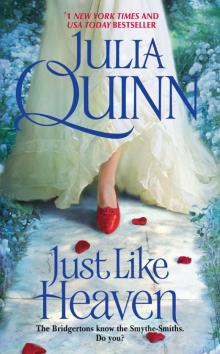 Just Like Heaven
Just Like Heaven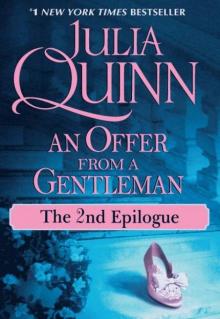 B03.2 An Offer from a Gentleman Ep II
B03.2 An Offer from a Gentleman Ep II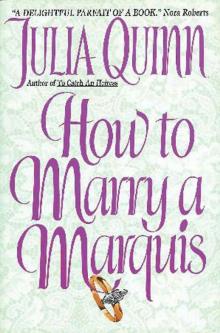 How to Marry a Marquis
How to Marry a Marquis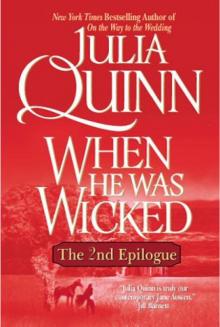 When He Was Wicked: The 2nd Epilogue
When He Was Wicked: The 2nd Epilogue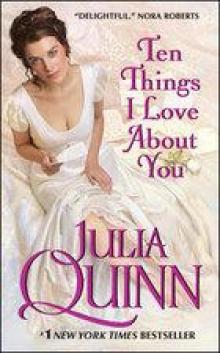 Ten Things I Love About You
Ten Things I Love About You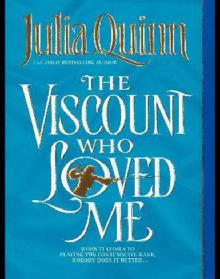 The Viscount Who Loved Me
The Viscount Who Loved Me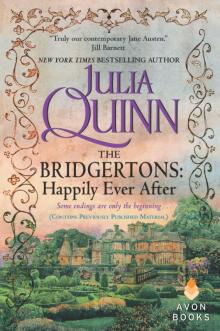 The Duke and I
The Duke and I B05.2 To Sir Philip With Love Ep II
B05.2 To Sir Philip With Love Ep II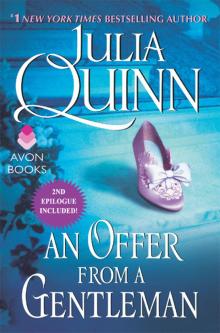 An Offer From a Gentleman: The 2nd Epilogue
An Offer From a Gentleman: The 2nd Epilogue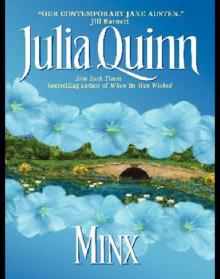 Minx
Minx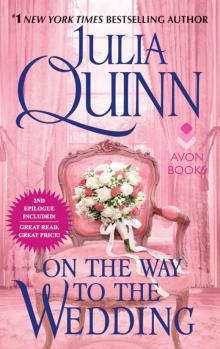 On the Way to the Wedding with 2nd Epilogue
On the Way to the Wedding with 2nd Epilogue Mr. Cavendish, I Presume
Mr. Cavendish, I Presume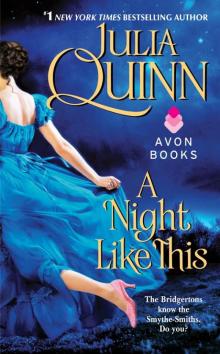 A Night Like This
A Night Like This Splendid
Splendid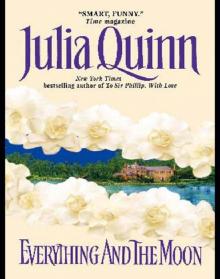 Everything and the Moon
Everything and the Moon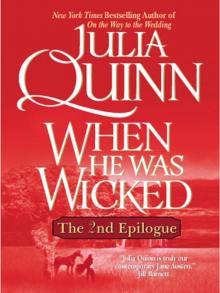 When He Was Wicked
When He Was Wicked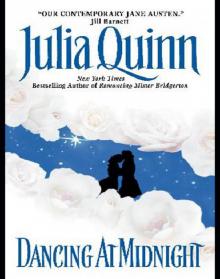 Dancing at Midnight
Dancing at Midnight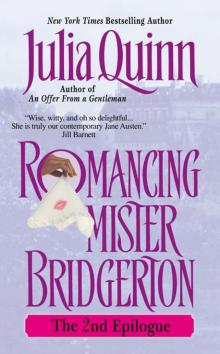 Bridgerton 04: 2nd Epilogue - Romancing Mister Bridgerton
Bridgerton 04: 2nd Epilogue - Romancing Mister Bridgerton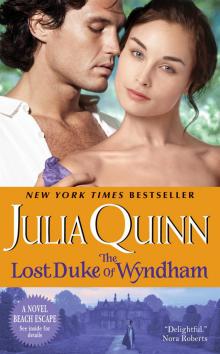 The Lost Duke of Wyndham
The Lost Duke of Wyndham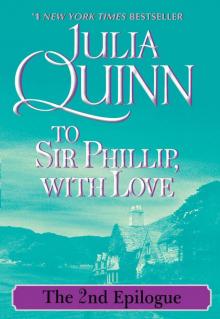 To Sir Phillip, With Love
To Sir Phillip, With Love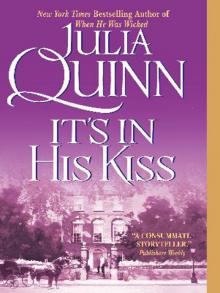 It's in His Kiss
It's in His Kiss The Other Miss Bridgerton
The Other Miss Bridgerton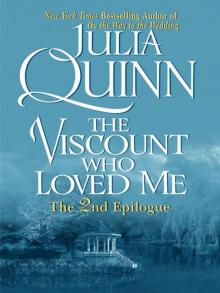 Bridgerton 02: 2nd Epilogue - The Viscount Who Loved Me
Bridgerton 02: 2nd Epilogue - The Viscount Who Loved Me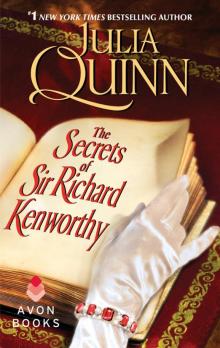 The Secrets of Sir Richard Kenworthy
The Secrets of Sir Richard Kenworthy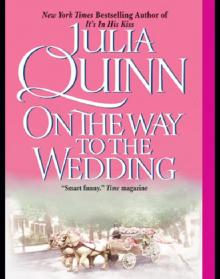 On the Way to the Wedding
On the Way to the Wedding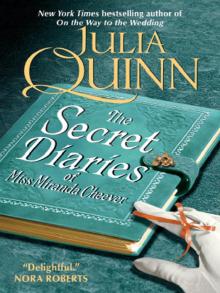 The Secret Diaries of Miss Miranda Cheever
The Secret Diaries of Miss Miranda Cheever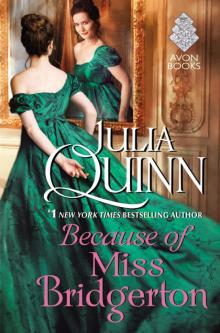 Because of Miss Bridgerton
Because of Miss Bridgerton What Happens in London
What Happens in London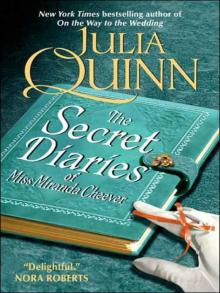 JQuinn - The Secret Diaries of Miss Miranda Cheever
JQuinn - The Secret Diaries of Miss Miranda Cheever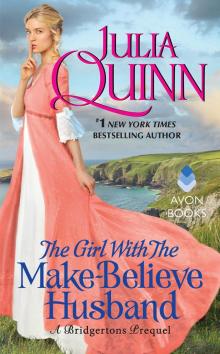 The Girl With the Make-Believe Husband
The Girl With the Make-Believe Husband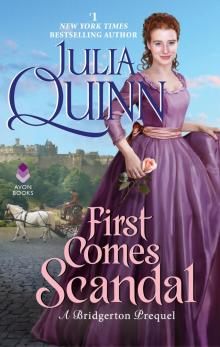 First Comes Scandal
First Comes Scandal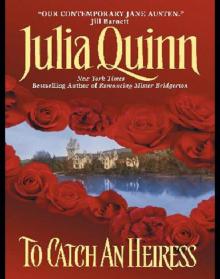 To Catch an Heiress
To Catch an Heiress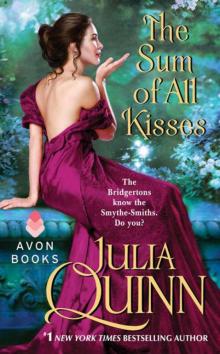 The Sum of All Kisses
The Sum of All Kisses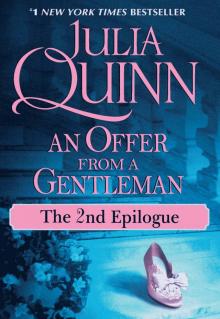 An Offer From a Gentleman
An Offer From a Gentleman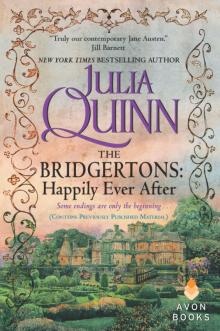 The Bridgertons: Happily Ever After
The Bridgertons: Happily Ever After Bridgerton Collection Volume 1 (Bridgertons)
Bridgerton Collection Volume 1 (Bridgertons)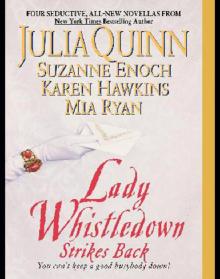 Lady Whistledown Strikes Back
Lady Whistledown Strikes Back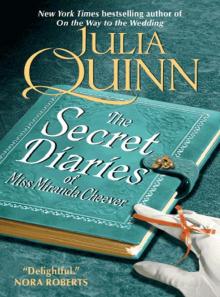 Secret Diaries of Miss Miranda Cheever
Secret Diaries of Miss Miranda Cheever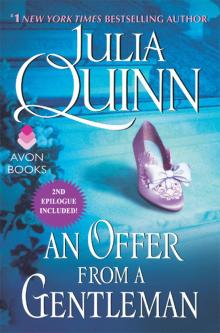 An Offer from a Gentleman with 2nd Epilogue
An Offer from a Gentleman with 2nd Epilogue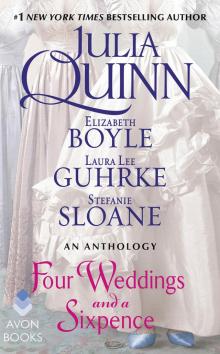 Four Weddings and a Sixpence
Four Weddings and a Sixpence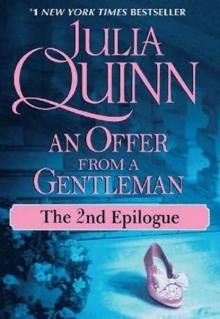 An Offer from a Gentleman: The Epilogue II
An Offer from a Gentleman: The Epilogue II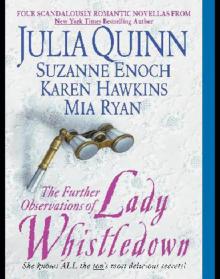 The Further Observations of Lady Whistledown
The Further Observations of Lady Whistledown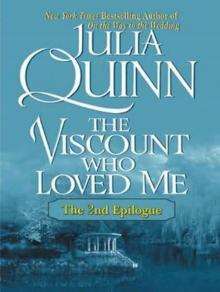 The Viscount Who Loved Me: The Epilogue II
The Viscount Who Loved Me: The Epilogue II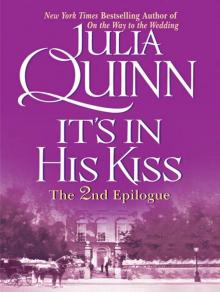 It’s In His Kiss Epilogue II
It’s In His Kiss Epilogue II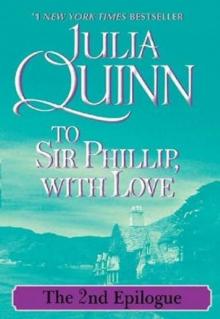 To Sir Phillip, with Love: The Epilogue II
To Sir Phillip, with Love: The Epilogue II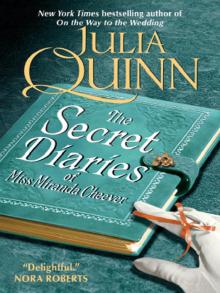 The Secret Diaries of Miss Miranda Cheevers
The Secret Diaries of Miss Miranda Cheevers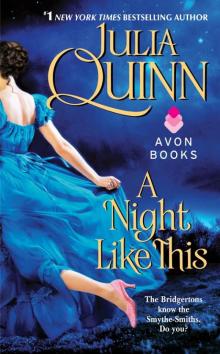 A Night Like This (Smythe-Smith Quartet)
A Night Like This (Smythe-Smith Quartet)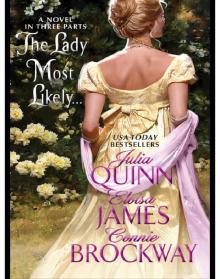 The Lady Most Likely...
The Lady Most Likely...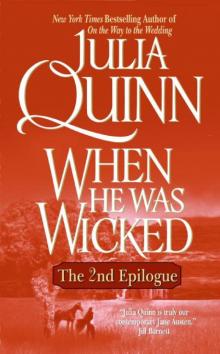 Bridgerton 06: 2nd Epilogue - When He Was Wicked
Bridgerton 06: 2nd Epilogue - When He Was Wicked Just Like Heaven sq-1
Just Like Heaven sq-1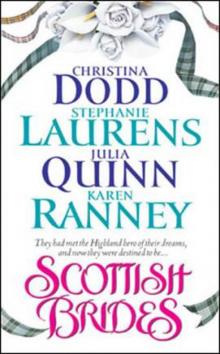 Gretna Greene
Gretna Greene